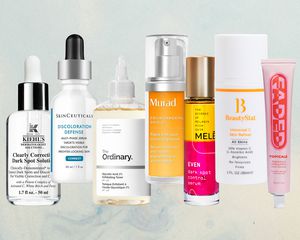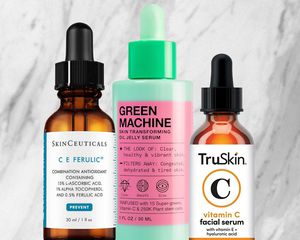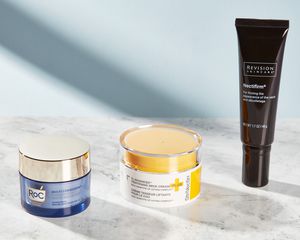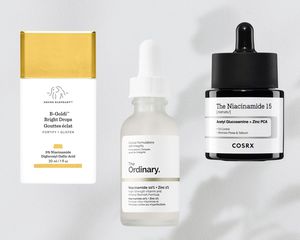:max_bytes(150000):strip_icc()/darkspots-21c95b8c0e8a45bebfdff2932ad934e7.png)
If you're looking to even skin tone, fade dark spots and acne scars, or reduce the appearance of hyperpigmentation, you’re probably curious about which products work best. While you've likely heard that vitamin C, retinol, and glycolic acid are the solutions to your concerns, one highly underrated, luminizing ingredient needs to be on your radar—arbutin.
Typically found in various skincare products, including serums, moisturizers, toners, and masks, arbutin is used as a topical dark spot lightener. Arbutin not only works to reverse dark spots but also prevents them from forming in the first place. Plus, it's generally safe for all skin types, making it a great option for sensitive skin. Have questions? We spoke with expert dermatologists Michael Lin, MD, and Claire Chang, MD, as well as cosmetic chemist Ginger King, to get the lowdown on what arbutin's benefits and side effects are, plus how to use it in your skincare routine.
Keep scrolling to learn more about this powerful yet oh-so-gentle skincare hero.
Meet the Expert
- Michael Lin, MD, is a board-certified dermatologist and founder of Dr. Lin Skincare. He currently has his own practice in Los Angeles, CA.
- Claire Chang, MD, is a board-certified cosmetic dermatologist at Union Square Laser Dermatology in New York City.
- Ginger King is a cosmetic chemist and president of Grace Kingdom Beauty, which specializes in cosmetic brand concept development and beauty business consulting.
What Is Arbutin?
“Arbutin is a molecule extracted from the bearberry plant that prevents the formation of melanin,” Lin explains. Brown spots come from pigments produced in cells called melanocytes, which contain tyrosinase enzymes. They can activate anytime they come in contact with UV light, which is why you’ll notice freckles and sun spots starting to develop if you spend too much time in the sun. That’s when arbutin comes in—it blocks tyrosinase and keeps dark spots at bay.
Arbutin
Type of Ingredient: Brightener
Main Benefits: Lightens dark spots, lessens the appearance of acne scars, and helps even skin tone.
Who Should Use It: Arbutin is generally safe for all skin types.
How often can you use it: Arbutin can be used twice a day. It is safe to apply on clean skin with other creams and serums. It can also be used in the summer since it does not make skin more sensitive to the sun.
Works well with: Vitamin C, AHAs
Don’t use with: While there are no known negative interactions with other skincare ingredients, heat can degrade the effectiveness of arbutin.
Alpha Arbutin vs. Beta Arbutin
On a base level, the main difference between these two ingredients is that alpha-arbutin is a synthetic form of arbutin, while beta-arbutin is a plant-derived form of arbutin. King notes that it's important to distinguish between alpha-arbutin and other similar-sounding ingredients, as beta-arbutin is a cheaper version of the ingredient that is less stable. Alpha-arbutin is the most stable and effective form of the ingredient, according to King.
Arbutin vs. Other Dark Spot Fading Ingredients
Lin compares arbutin to two other gentle brighteners: kojic acid (derived from mushrooms) and licorice root (derived from the licorice plant). “[They] are derived from different natural ingredients, but they all function as tyrosinase inhibitors to provide skin lightening and brightening effects,” he says.
Hydroquinone is another popular skin tone-evening ingredient. But unlike arbutin, hydroquinone interacts with the melanin-producing cells in the skin, decreasing pigment production. According to our experts, arbutin is the gentler option, as long-term usage of hydroquinone may cause itching, redness, or inflammation.
Benefits of Arbutin for Skin
- Has sun protection properties: Arbutin can reduce the degree of skin darkening after sun exposure by blocking the production of tyrosinase.
- Gentle on skin: While other skin brightening agents can dry and irritate the skin, arbutin is less irritating. “Since arbutin’s active component is released slowly, it can be less irritating than other skin-lightening agents and better for those with sensitive skin,” Lin says.
- Improves uneven complexion: Since arbutin inhibits tyrosinase, an enzyme that helps with melanin production, it can prevent dark spots or even help fade them, leading to a more even complexion.
- Can be used twice daily: For maximum results, arbutin can be used both in the morning and at night.
- Effective at fading scars: Much like its ability to fade dark spots, arbutin is also great at fading those red-purple acne scars that stick around long after a zit is gone.
- Brightens skin: As explained above, arbutin prohibits the formation of dark spots, offering a brightening effect on the skin.
Side Effects of Arbutin
Before you go and buy every arbutin skin product out there, you should know this: There have been some people who get nervous about arbutin, because of the similar brightening benefits it has with hydroquinone. However, arbutin is widely considered a safe and effective ingredient for skin lightening.
“Arbutin is available in some skincare products designed to improve pigmentation,” Lin says. “Use of these products regularly in your routine will improve your complexion.” One thing he notes is that arbutin can be a great way to lighten acne scars—he recommends using acne treatments with natural ingredients and arbutin, like his eponymous line’s 2-Step Acne Clarifying System ($46), to lighten dark spots that can linger after acne fades.
How to Use It
Chang recommends using arbutin twice daily after cleansing but before any heavy moisturizers.
"You will be surprised to find arbutin is in many of your existing skincare products, especially skin brightening products," Chang continues. While arbutin is mainly in skincare serums, it's also a superstar ingredient in overnight masks and water creams.
King says it's best to mix arbutin with other ingredients that offer similar brightening effects, such as vitamin C and AHA, but exercise caution when trying any new product. "When at a high pH, [arbutin] will release hydroquinone, but fortunately, most of the personal care products have a neutral pH," cautions King. In other words, "arbutin is generally safe but some people can have sensitivity to it," she adds.
Is Arbutin Safe to Use on Sensitive Skin?
"Because arbutin tends to be gentle, it can be used in combination with other skin-lightening ingredients, like chemical peels and retinol," says Chang. That means it's safe for even the most sensitive skin (though, as with any new product, it's best to see a professional and discontinue use if you notice an adverse reaction).




